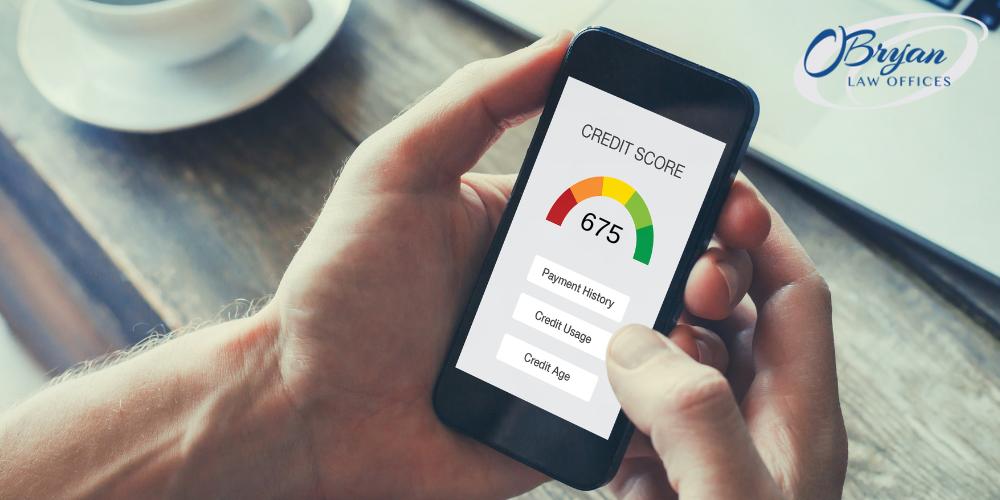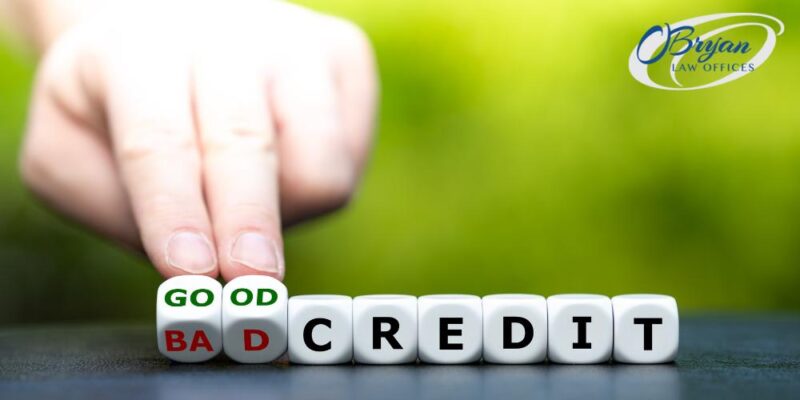675 Credit Score to 699 Credit Score


Despite the fact that a credit score is only three numbers long, it can have a significant impact on your financial status. Your bankruptcy credit score ranges may affect your ability to qualify for a loan or acquire a credit card. It signals to potential lenders how likely you are to repay your debts. So, is 675 a good credit score? How can you improve that score?
Understanding credit score ranges will help you determine whether or not you need to improve your credit. Knowing what factors affect your credit score might help you figure out how to increase it over time. Contact a Louisville bankruptcy attorney today for help on restoring your credit. To schedule a free consultation, call our office at 502-339-0222 today.
What Is a Credit Score?
A credit score is a number that shows how trustworthy someone is with money. Lenders, landlords, and financial institutions use it to decide if they should lend money or offer financial services, like an auto loan or mortgage loan, to that person. The score is calculated from their credit report, which includes their financial history and behavior. According to FICO and VantageScore, the minimum credit score is 300, and the maximum score is 850.
How to Calculate Credit Scores
To calculate credit scores, the three major credit bureaus use a variety of factors and complex algorithms. These algorithms typically consider the following information.
- Payment History (35%): Pay your bills on time, as late payments can significantly impact your score.
- Credit Utilization Ratio (30%): Keep your credit card balances low relative to your credit limits. Aim to use less than 30% of your total credit limit.
- Credit History (15%): Keep old, well-managed accounts open to maintain a longer credit history.
- Credit Mix (10%): Have a mix of different types of credit, such as credit cards, installment loans, and mortgages, to demonstrate responsible credit usage.
- New Credit (10%): Avoid opening multiple new credit accounts in a short period, as it can lower your score.
What Is a Fair Credit Score?
What constitutes fair credit varies depending on the credit ratings you’re looking at—and the credit-scoring business that generated them. The variations in models from two widely utilized businesses may be seen below.
FICO says a fair credit score ranges from 580-669. While fair credit scores are below average in the United States, lenders may nevertheless approve consumers for credit products. However, your options may be restricted.
VantageScore says a fair credit score ranges from 601-660. Approval for loans or credit cards may be more challenging for those with fair credit ratings. Furthermore, loan approvals may be accompanied by increased interest rates.
Fair credit is considered to be at the center of credit score levels. The numbers increase as the score improves. Fair credit ratings are a step down from good credit scores. FICO considers a good credit score to be between 670 and 739, whereas VantageScore considers a good credit score to be between 661 and 780.
What Is a Good Credit Score?
FICO scores vary from 300 to 850, with 670 to 739 being considered “good” by FICO. FICO’s industry-specific credit ratings range from 250 to 900 points. The intermediate categories, on the other hand, have the same groupings, and a “good” industry-specific FICO Score ranges from 670 to 739.
The first two VantageScore credit rating algorithms have ranges of 501 to 990. The range for the two newest VantageScore credit ratings is 300 to 850, which is the same as the FICO Scores. VantageScore considers 661 to 780 to be a good range for the most recent models.
Fair vs Good Credit Score
The stronger your credit, the more likely you are to get approved for credit cards. But that’s only the beginning. Having good credit is beneficial in a variety of ways.
- Credit cards: If you have a strong credit score, you may be able to apply for a credit card that best suits your needs, whether you want a solid rewards program or a lower APR.
- Loans and mortgages: Creditworthiness can also help you qualify for mortgages, vehicle loans, and other types of borrowing.
- Interest rates: Your credit score may be used by the lender when determining your interest rate or credit limit if you qualify for a loan or credit card. In general, having a higher credit score may enable you to obtain better conditions.
- Applying for rentals: Landlords may obtain a copy of your credit record in order to determine if you are eligible for an apartment lease.
- Job applications: Employers may pull your credit records during a background check if you provide them written authorization.
- Insurance premiums: Insurers may evaluate your credit history for setting premiums, depending on state regulations.
- Deposits: For those with good credit, phone companies and utility companies may waive security deposits.
These are just a few of the reasons why having a higher credit score is so important. There are things you can do to help improve your scores if you’re not happy with them.
Ways to Improve a Fair Credit Score
While you may be able to acquire personal loans with fair credit, raising your score may allow you to get better conditions. Here are a few things you may do to enhance your credit score.
- Responsible use of credit: There are several techniques to demonstrate to lenders that you are a responsible borrower. Aim to pay your payments on time every month to demonstrate to lenders that you are adhering to the terms of your contract. Also, attempt to keep your credit utilization rate as low as possible. The Consumer Financial Protection Bureau (CFPB), for example, suggests that you maintain your credit card balance at no more than 30% of your total credit card limit on all accounts.
- Avoid mistakes on payments: Paying only the minimal amount due or exceeding your credit limit might increase your credit use and lower your credit score. Paying your invoices late might also harm your credit score. Aside from the credit, you could find yourself paying extra in interest or fees.
- Consider your applications: Too many credit accounts opened in a short period might damage your credit score. Recent queries are used in credit score algorithms. Additionally, lenders may get an unfavorable picture of your financial situation.
- Watch over your credit: Regularly reviewing your credit reports can ensure that the data used to generate your credit score is correct.
- Avoid quick fixes: Remember that restoring your credit takes time. There is no such thing as a quick cure for bad credit. However, there is never a terrible moment to start adopting healthy credit-building behaviors.
675 Credit Score Through 699 Credit Score
If you’re looking to get a car loan, home loan, unsecured credit card, or other form of credit, it’s important to understand how your score may affect you. Below, we explain how scores between a 675 credit score and 699 credit score may fare in seeking loans and credit.
Is 666 a Good Credit Score?
The average FICO Score is 704, which is somewhat higher than your 666, indicating that you have a lot of room to improve. In fact, approximately 70% of consumers in the United States have scores higher than 666.
Furthermore, your 666 credit score is nearly within the Good credit score range of 670-739. With little effort, you may be able to improve that score range, allowing for access to a wider choice of credit and loans at lower interest rates.
Examining the report that comes with your credit score might help you determine what happened to reduce your score. You may create the basis for a better credit score if you address the behaviors that lead to those occurrences and work gradually to improve your credit.
Is 669 a Good Credit Score?
This score is just below the Good credit score range of 670-739, which means you’re nearly there. While everyone with a FICO Score of 669 has a different road to get there, those with scores in the Fair range frequently have credit management issues.
A 669 FICO Score is an excellent place to start when it comes to improving your credit score. Increasing your credit score to the excellent range can lead to additional credit alternatives, cheaper interest rates on auto loans and mortgages, and fewer fees.
Is 675 a Good Credit Score?
A FICO score of 675 is in the Good range of scores, which ranges from 670 to 739. Consumers with Good FICO Scores are considered “acceptable” customers by a significant number of U.S. lenders, which means they consider you eligible for a wide range of credit products, while they may not charge you the lowest interest rates or extend you their most selective product offerings.
A score of 675 allows you to apply for a wide range of loans and credit cards, but raising your score can boost your chances of being approved for even more, and at more inexpensive conditions.
Furthermore, because a 675 credit score is on the lower end of the Good range, you’ll want to keep an eye on it to avoid falling into the more restrictive Fair credit score area.
Is 677 a Good Credit Score?
With a credit score of 677, you’re in the “good” range. To improve your credit score and move it into the “very good” range, consider taking steps to manage your credit more responsibly. This might involve making consistent, on-time payments, reducing credit card balances, and maintaining a longer positive credit history.
Is 680 a Good Credit Score?
Having a credit score of 680 is generally seen as acceptable by many lenders, and it should allow you to qualify for various credit products, including loans and credit cards. However, the specific terms and interest rates you’ll receive may vary depending on the lender and the type of credit you’re seeking.
Is 685 a Good Credit Score?
A credit score of 685 falls within the “good” range. It will allow you to access many lending opportunities. However, improving your score even more can yield lower interest rates and better terms, so it’s worth it to work on raising your score.
Is 690 a Good Credit Score?
Yes, 690 is a good credit score. Approximately 21% of Americans have credit scores in the “good” range. With this score, you should be able to qualify for many loans and lines of credit with decent interest rates and terms. However, those interest rates and terms could improve further if you raised your score to the “very good” range.
Is 693 a Good Credit Score?
A score of 693 falls in the Good range. With a Good Score, you’re rather typical among American shoppers. That’s not always a terrible thing, but with a little time and work, you can improve your score to the Very Good (740-799) or even Exceptional level (800-850). Moving in that direction will require knowledge of the actions that aid and impede score increase.
Your score is good, and you have a decent chance of qualifying for various loans. However, if you can raise your credit score to the Very Good (740-799) or Exceptional (800-850) categories, you may be eligible for lower interest rates, which may save you thousands of dollars for your loans.
Is 695 a Good Credit Score?
Yes, a 695 credit score falls in the “good” range. Getting car loans, home loans, credit cards, and other forms of credit should be easy with a score of 695. Your terms and interest rates should be decent, but they can improve if you work to raise your score higher.
Is 699 a Good Credit Score?
A score of 699 is considered “Good.” With a 699 credit score, getting a mortgage, vehicle loan, or personal loan is very simple. Because it is less hazardous, lenders prefer to work with consumers who have good credit.
Remove any negative accounts, including collections, charge-offs, medical bills, bankruptcies, and so on. Remove as many unnecessary hard queries as possible. Reduce your revolving usage as much as possible. Ensure you have a proper mix of installment loans and revolving accounts on your credit report. Finally, make sure you have at least two revolving accounts that are more than two years old.
Will Filing Bankruptcy Help My Credit?
When you file for bankruptcy, your credit score might be harmed almost immediately. In fact, when compared to foreclosure and other debt collection measures, many people believe bankruptcy to have the most negative influence on your credit score. However, no one knows how much credit harm particular events, such as bankruptcy, foreclosure, a short sale, or a deed in lieu of foreclosure, would cause.
If you find yourself in a situation where you need to file for bankruptcy, your credit score is less significant than the grounds for filing. A looming paycheck garnishment or mortgage foreclosure is not as urgent as getting a new loan or credit card. However, once you’ve been granted bankruptcy relief, you could discover that the bankruptcy really helps your credit. Even though your bankruptcy will appear on your credit report for up to 10 years, this is true.
Bankruptcy provides you the chance to start over by erasing your debt history. You have another opportunity to get your finances in order. You can create the groundwork for creating a solid credit history if you budget correctly and diligently manage your money.
Contact O’Bryan Law Offices for Credit Counseling
We put our extensive knowledge of credit and bankruptcy to work for our clients at O’Bryan Law Offices. We can assist them whether they want to file for bankruptcy to reorganize their finances or just require debt counseling. A knowledgeable Louisville bankruptcy lawyer will walk you through each stage of the process and help you emerge in a better financial situation. We can help you access and analyze your free credit report to have a better understanding of how to raise your score. Call 502-339-0222 today for more information or to book your free consultation.









